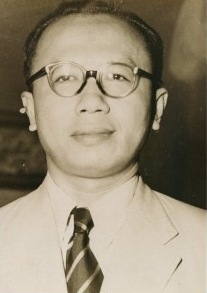
Back Raden Juanda Kartawijaya BAN Djoeanda Kartawidjaja BJN Djuanda Kartawidjaja German Djuanda Kartawidjaja French Djoeanda Kartawidjaja ID Djoeanda Kartawidjaja JV Djuanda Kartawidjaja Malay Djoeanda Kartawidjaja Dutch Djuanda Kartawidjaja Polish Джуанда Картавиджайя Russian
Djuanda Kartawidjaja | |||||||||||||||||||||||||||||||||||||||||||||
|---|---|---|---|---|---|---|---|---|---|---|---|---|---|---|---|---|---|---|---|---|---|---|---|---|---|---|---|---|---|---|---|---|---|---|---|---|---|---|---|---|---|---|---|---|---|
 Official portrait, 1959 | |||||||||||||||||||||||||||||||||||||||||||||
| 11th Prime Minister of Indonesia | |||||||||||||||||||||||||||||||||||||||||||||
| In office 9 April 1957 – 9 July 1959 | |||||||||||||||||||||||||||||||||||||||||||||
| President | Sukarno | ||||||||||||||||||||||||||||||||||||||||||||
| Deputy | |||||||||||||||||||||||||||||||||||||||||||||
| Preceded by | Ali Sastroamidjojo | ||||||||||||||||||||||||||||||||||||||||||||
| Succeeded by | |||||||||||||||||||||||||||||||||||||||||||||
| |||||||||||||||||||||||||||||||||||||||||||||
| Personal details | |||||||||||||||||||||||||||||||||||||||||||||
| Born | 14 January 1911 Tasikmalaya, Preanger Residency, Dutch East Indies | ||||||||||||||||||||||||||||||||||||||||||||
| Died | 7 November 1963 (aged 52) Jakarta, Indonesia | ||||||||||||||||||||||||||||||||||||||||||||
| Alma mater | Technische Hoogeschool te Bandoeng | ||||||||||||||||||||||||||||||||||||||||||||
Djuanda Kartawidjaja (EYD: Juanda Kartawijaya; 14 January 1911 – 7 November 1963), more commonly referred to mononymously as Djuanda, was an Indonesian politician and technocrat who held various positions during the presidency of Sukarno, most notably as prime minister of Indonesia and a cabinet minister in several cabinets.
Born into a noble ethnic Sundanese family, he graduated in engineering at the Technische Hoogeschool te Bandoeng in Bandung. He then worked as a teacher and later an engineer. Following the proclamation of Indonesian Independence in 1945, he joined the newly-formed Republican government and served in several cabinets, mostly in economic portfolios. In 1957, Djuanda was appointed prime minister by Sukarno following the inability of the parties to form a cabinet. As prime minister, he is remembered for his role in proclaiming the Djuanda Declaration. In 1959, Sukarno appointed himself prime minister but retained Djuanda as first minister with much the same duties as before. He died in 1963.
Djuanda's death and the abolition of the post of Prime Minister in the Indonesian Republican system allowed far greater power to be exercised by the President, now being given full ruling power with minimal oversight, as both Head of State and Head of Government. This had an enormous impact on Indonesian politics, allowing the constitutional legality of the autocracy of Sukarno and Suharto, also contributing to the absence of an economic policy in the later years of Sukarno's Guided Democracy.
Since his death, various landmarks have been named in his honor, including Juanda International Airport in Surabaya, and Juanda railway station in Jakarta. He is also depicted in the recent 2016 edition of Rp 50,000 Indonesian rupiah banknotes.